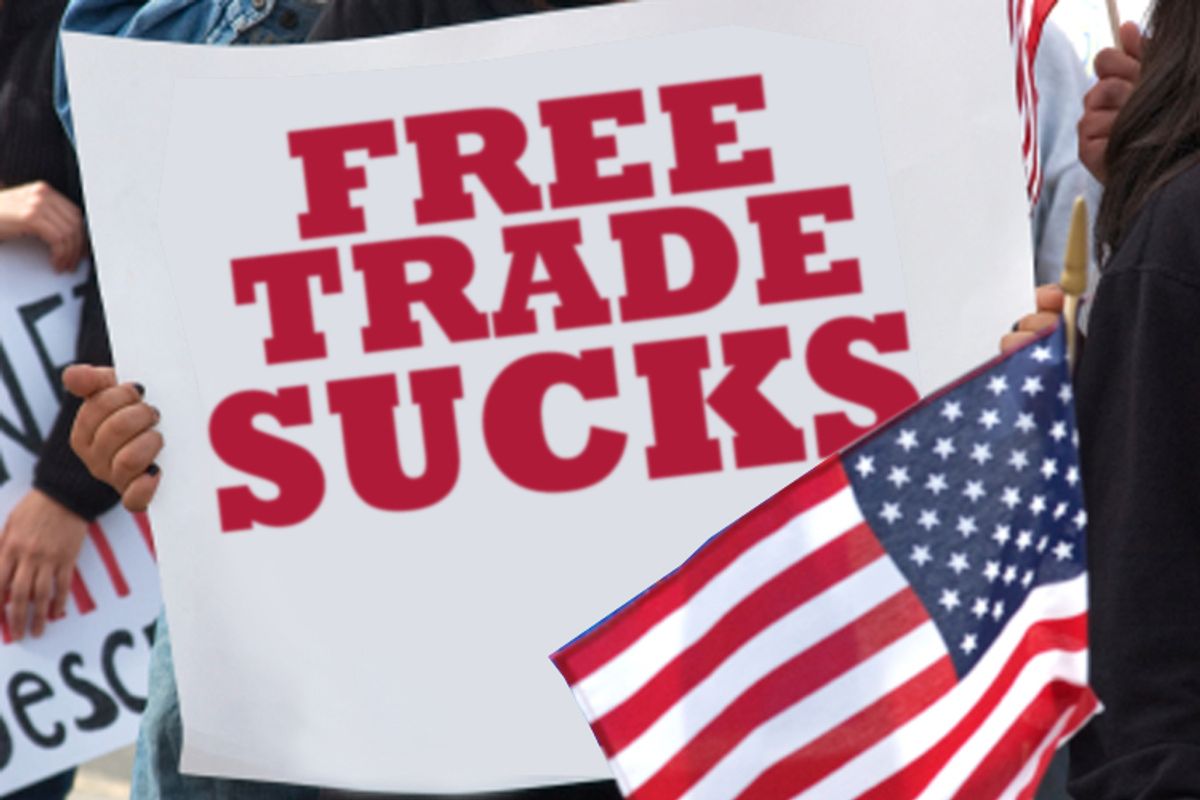"Americans Sour on Free Trade," blasts a Wall Street Journal headline prominently featured on the newspaper's website. "Majority Say Free-Trade Pacts Have Hurt U.S."
Note the word "majority." Opposition to free trade in the U.S. is now a bipartisan position, as common to Tea Partiers as to organized labor.
"The rising hostility seems a delayed reaction to a slow economic recovery and high unemployment," write reporters Sara Murray and Douglas Belkin.
That's part of it, sure. A down economy always seems to go hand in hand with tensions over trade. And never mind the fact that so-called free trade pacts are really just vehicles through which powerful American corporate sectors such as the pharmaceutical industry seek to leverage access to American markets for their own specifically crafted opportunities. The phenomenon that the Journal is noticing reflects a much deeper distrust of engagement with the global economy that goes back a lot further than the Journal appears prepared to admit. The economic argument for free trade -- that everyone benefits when countries maximize their comparative advantage -- has little sway when the on-the-ground reality is that the winners from free trade in the U.S. seem to be far outnumbered by the losers.
Growing income inequality and a progressively more squashed middle class have been in the works for decades. Yes, expanded trade with China has lowered consumer prices for all kinds of goods, but that doesn't compensate for the fact that job security is in tatters and the social welfare net is paper-thin.
People feel vulnerable, and vulnerability breeds fear. One wonders if it could all have been different -- if the U.S. had a comprehensive healthcare system already in place that did not link your insurance to your job, or if tax policy didn't disproportionately favor corporations and the wealthiest Americans over the masses, would the average U.S. citizen feel less threatened by global competition? But it seems almost pointless to ask that question now. That ship has sailed. The damage is done and populists of every political stripe are itching for a trade war.
The paradox here is that just as U.S. sentiment is reaching an anti-free trade peak, the importance of vigorous participation in the global economy is greater than ever. Key emerging nation economies -- China, India, Brazil -- are growing faster than that of the U.S. Bloomberg News reports a Goldman Sachs prediction that global economic growth "will slow 0.2 percentage point to 4.6 percent in 2011, even as expansion in the U.S. falls to 1.8 percent from 2.6 percent. "
The gap in growth rates between the developing and advanced worlds is widening, he said. Emerging economies will account for about 60 percent of global expansion this year and next, up from about 25 percent a decade ago, [estimates David Lubin, chief economist for emerging markets at Citigroup Inc. in London.]
... A book published last week by the World Bank..... "The Day After Tomorrow" concludes that developing nations aren't only decoupling, they also are undergoing a "switchover" that will make them such locomotives for the world economy, they can help rescue advanced nations. Among the reasons for the revolution are greater trade between emerging markets, the rise of the middle class and higher commodity prices, the book said.
So here's what's going to happen. The rising middle classes of India and Brazil and China will be increasingly engaging in trade relationships between each other that bypass the foundering United States, where the middle class has been hammered and is barely hanging on. Consumer power is moving from the former core to the new periphery. The historical irony is brutal: Just as popular sentiment in the U.S. seems to be hitting a crisis point in terms of our willingness to engage with the rest of the world, our avid and aggressive participation in the global economy has never been more important. The emerging nations of the world are only going to "rescue" the advanced nations if the advanced nations are willing to play along.



Shares